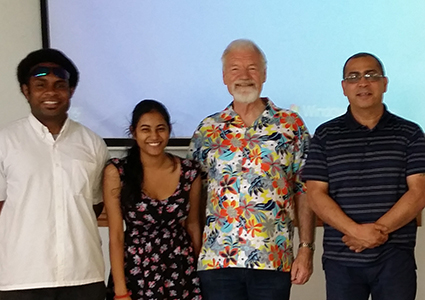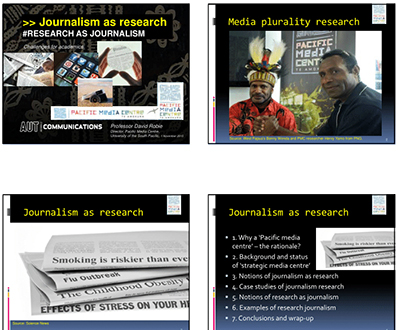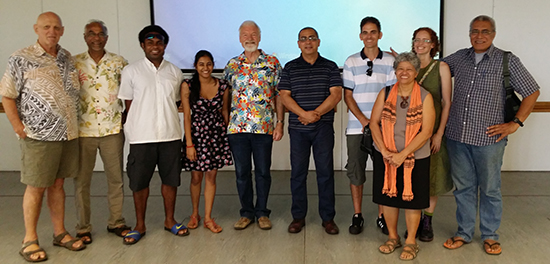
SUVA (Wansolwara / Pacific Media Watch): Journalism schools need to step up and be more significant and independent players in the region's news media to ensure the public interest is served well, says journalism professor Dr David Robie.
Dr Robie, who is also director of the Auckland University of Technology’s Pacific Media Centre which publishes Pacific Scoop, made the comment during a seminar on "Journalism as research-Research as journalism" at the University of the South Pacific's Laucala Campus in Suva.
“I think they need to step up and realise they’re part of the whole communication mix,” he said.
“We can’t just leave it to mainstream media, which by and large are businesses.” He said the J-schools should build greater capacity in varied, innovative and digital media.
He said the J-schools should build greater capacity in varied, innovative and digital media.
“The legacy (traditional) media, I think, will lose more and more currency and resources to do investigative work. It is in this innovative area that universities can actually step up and be more important media players than at present,” said Dr Robie.
J-schools also had the luxury of more flexible deadlines to allow for more independent news coverage and analysis.
Failing models
The present dynamics of the mainstream media with failing business models had led to a more restricted and narrow coverage of current affairs. He cited limited New Zealand media coverage of climate change and West Papua as examples.
“This meant less and less time for any kind of reflective journalism or any kind or real research and so on,” further reinforcing the need for media academics to provide this role, Dr Robie said.
He gave several examples of leading journalists doing innovative research based on documentaries, "public good websites" and investigative journalism.
He said academics were public intellectuals but the unfortunate truth was that a lot of research did not reach the public domain and was thus absent from public discourse.
Another challenge Dr Robie linked to mainstream media was its increased tendency to "dumb down" research produced in academic institutions.
Addressing academics in the audience, he said networking with news media professionals "you can trust" was the best way to resolve this.
He reasoned that working with individual journalists would boost chances of academics getting improved and accurate coverage.
Building networks
In addition to building networks, he advised a strong online presence via strategic publications.
Dr Robie recommended academics publish their own blogs and contribute commentaries to credible online resources or websites, like the Lowy Institute, the Vanuatu-based Pacific Institute of Public Policy website, and The Conversation, an independent Australian and UK-based academic-journalism partnership.
Publishing in several good sites would raise academic profiles significantly, he said, and mean less dependency on the mainstream media.
“The mainstream media was becoming more and more fragmented all over the world… and this is why more and more of you need to have a media-savvy approach to publicising your research,” Dr Robie told academics.
He also touched on the need to leverage social media tools like Facebook - and its academic variants liked Academia.edu and Research Gate - and Storify to gain a wider audience and following.
He complimented the award-winning USP student journalist newspaper Wansolwara on its sustained good work over 19 years.
Dr Robie, who was head of journalism at USP between 1998-2002, also gave an address on "The digital media revolution, a free press and the student press" at the annual campus journalism awards.

This work is licensed under a Creative Commons Attribution-NonCommercial 3.0 New Zealand Licence.




